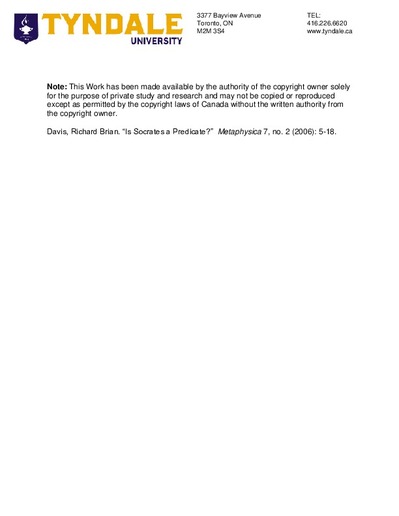| dc.rights.license | Attribution-NonCommercial-NoDerivatives 4.0 International License | en_US |
| dc.contributor.author | Davis, Richard Brian, 1963- | |
| dc.date.accessioned | 2023-05-04T18:10:27Z | |
| dc.date.available | 2023-05-04T18:10:27Z | |
| dc.date.copyright | 2006 | |
| dc.date.issued | 2006 | |
| dc.identifier.citation | Davis, Richard Brian. “Is Socrates a Predicate? Metaphysica 7, no. 2 (2006): 5-18. | en_US |
| dc.identifier.issn | 1874-6373 | en_US |
| dc.identifier.uri | https://digitalcollections.tyndale.ca/handle/20.500.12730/2590 | |
| dc.description.abstract | In his Moderate Realism and Its Logic (Yale, 1996), Donald Mertz argues that the traditional ontology of nonpredicable substances and predicable universals is beset by “intractable problems,” “harbors an insidious error,” and constitutes a “stumbling block” for the ontologist. By contrast, a one-category ontology consisting of relation instances (and combinations thereof) is sustainable, and indeed the only way of avoiding commitment to bare particulars. The success of the project turns on Mertz’s claim that every relation instance has a linking aspect, so that (in a sense) even Socrates is a predicate. I argue that, ironically, it is this very feature of a relation instance that undermines Mertz’s entire theory of predication, effectively preventing any connections from being formed between the instances that allegedly compose an ordinary individual such as Socrates. | en_US |
| dc.format.medium | Paper | en_US |
| dc.format.mimetype | application/pdf | en_US |
| dc.language.iso | en | en_US |
| dc.publisher | De Gruyter | en_US |
| dc.rights | Copyright, De Gruyter. All rights reserved. | en_US |
| dc.rights.uri | https://creativecommons.org/licenses/by-nc-nd/4.0/ | en_US |
| dc.subject.lcsh | Predicate (Logic) | en_US |
| dc.subject.lcsh | Individuation (Philosophy) | en_US |
| dc.subject.lcsh | Universals (Philosophy) | en_US |
| dc.subject.lcsh | Mertz, D. W. (Donald W.), 1947- | en_US |
| dc.title | Is Socrates a Predicate? | en_US |
| dc.type | Article | en_US |
| dc.contributor.affiliation | Tyndale University College & Seminary | en_US |
| dc.contributor.department | Department of Philosophy | en_US |
| dc.contributor.repository | Tyndale University, J. William Horsey Library, 3377 Bayview Ave., Toronto, ON, M2M 3S4, Canada. Contact: repository@tyndale.ca | en_US |
| dc.identifier.bibrecord | https://tyndale.on.worldcat.org/oclc/9788830067 | en_US |
| dc.identifier.issue | no. 2 | en_US |
| dc.identifier.journal | Metaphysica | en_US |
| dc.identifier.orcid | https://orcid.org/0000-0003-4608-6172 | en_US |
| dc.identifier.volume | 7 | en_US |
| dc.publisher.place | Berlin, Germany | en_US |
| dc.rights.holder | https://www.degruyter.com/publishing/repository-policy?lang=en | en_US |
| dc.subject.keyword | Predication (Logic) | en_US |
| dc.subject.keyword | Predicable universals | en_US |
| dc.subject.keyword | Predication | en_US |
| dc.subject.keyword | Individuals | en_US |
| dc.subject.keyword | Universals (Philosophy) | en_US |
| dc.subject.keyword | Mertz, D. W. (Donald W.), 1947- | en_US |
| dc.description.chapterpage | 5-18 | en_US |
| dc.description.note | For AODA accommodation, including help with reading this content, please contact repository@tyndale.ca | en_US |


